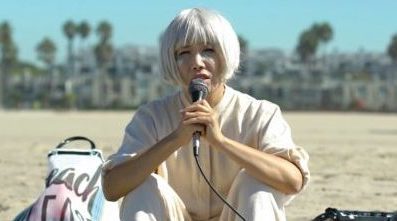@Scottish Youth Theatre as part of the Scottish Queer International Film Festival
Opening in a Los Angeles supermarket, White Rabbit thrusts us into one of central character Sophia’s performance art pieces without context, bemusing us as much as the shoppers that surround her. In the following scenes, as she peels off her wig and scrubs off makeup, the character underneath emerges: a free-spirited but anxious artist struggling to make ends meet and trying to move on from a recent breakup.
The plot moves us through a brief period in Sophia’s life as she encounters Victoria, a photographer who seems as equally creative and forward-thinking as the protagonist. The pair spend several days together, conveyed through a montage of party gatherings and art events, until Victoria leaves to spend a week working in New York. It is at this point that the dizzy romantic high begins to fizzle for Sophia as she, and the audience, realise the reality behind the euphoria.
Lead performers Vivian Bang (Sophia) and Nana Ghana (Victoria) are key to the film’s charm. They are engaging, animated and funny, and Bang’s ad-libbed lines make some scenes feel documentary-like and others hilariously wacky — highlights include an argument between Sophia and Victoria outside a restaurant and a spur-of-the-moment therapy session with a stranger. Both have the SQIFF audience in fits of laughter. The soundtrack is also a winner, with alt-pop and indie music from the likes of Mirah and Big Thief that mirrors Sophia’s LA hipster lifestyle and helps add to the upbeat atmosphere of artsy ‘coolness’.
Where the film falls short is perhaps in its narrative simplicity. A very brief webcam scene with Sophia’s Korean mother feels like a missed opportunity for further character development. Likewise, one flashback scene to Sophia’s previous relationship provides emotional insight but isn’t touched on in any detail outside of this moment. Even the performance art scenes, while oddly engaging, could have been used to illuminate Sophia’s psyche even more. As a result, what seems intended to be a profound, moving finale scene doesn’t hold much weight after the modest 71-minute running time.
White Rabbit is mostly a success as a platform for its actors’ talents — Bang and Ghana entertain and showcase themselves as comedic and bold performers. In some ways it feels an odd choice as SQIFF’s closing night centrepiece, though. It’s competent, engaging enough, and makes us laugh in the right places, but doesn’t leave us with too much else to ponder after the credits roll.
